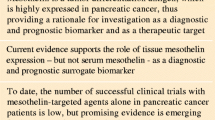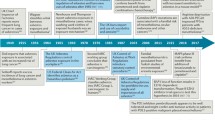Abstract
Purpose
The cell surface glycoprotein Mesothelin is overexpressed in several tumor entities and novel immune-based therapies are currently under the early clinical evaluation for the treatment of malignant pleura mesothelioma, ovarian cancer, and pancreatic cancer. Cervical cancer has not been recognized as a suitable target for Mesothelin-directed immune therapies so far.
Methods
To exploit a possible role of Mesothelin in cervical cancer treatment, we analysed Mesothelin expression in 79 cervical carcinomas and aligned expressions patterns with tumor growth parameters. A novel anti-Mesothelin drug conjugate (Anetumab Ravtansine) was applied for dose-efficiency studies in a Mesothelin positive tumor model for cervical cancer in Scid mice.
Results
In more than three-quarters (77%) of cervical adenocarcinomas, Mesothelin was expressed to high levels. Among squamous cell carcinomas of the cervix uteri expression levels were lower and expression patterns were less intense, but still ranged between 50–60% (57%). A significant correlation between Mesothelin expression levels and tumor grade, metastatic behaviour, and lymph- or hemangiosis was not found. The novel anti-Mesothelin-drug conjugate (Anetumab Ravtansine) showed a substantial dose-dependent therapeutic efficiency in a xenotransplant model for cervical cancer in SCID mice (hela cell tumors). Applying the ADC at a dose of 10 mg/kg twice weekly induced complete tumor regression in 88% of animals within 6 weeks.
Conclusions
Mesothelin should be taken into account as a target in cervical cancer therapy and histological determination of Mesothelin expression should be considered in routine diagnostics of cervical carcinomas.


Similar content being viewed by others
References
Chang K, Pastan I, Willingham MC (1992) Isolation and characterization of a monoclonal antibody, K1, reactive with ovarian cancers and normal mesothelium. Int J Cancer 50:373–381
Einama T, Kawamata F, Kamachi H, Nishihara H, Homma S, Matsuzawa F et al (2016) Clinical impacts of mesothelin expression in gastrointestinal carcinomas. World J Gastrointest Pathophysiol 7:218–222
Bera TK, Pastan I (2000) Mesothelin is not required for normal mouse development or reproduction. Mol Cell Biol 20:2902–2906
Reiter Y, Pastan I (1996) Antibody engineering of recombinant Fv immunotoxins for improved targeting of cancer: disulfide-stabilized Fv immunotoxins. Clin Cancer Res 2:245–252
Hassan R, Bullock S, Premkumar A, Kreitman RJ, Kindler H, Willingham MC et al (2007) Phase I study of SS1P, a recombinant anti-mesothelin immunotoxin given as a bolus IV infusion to patients with mesothelin-expressing mesothelioma, ovarian, and pancreatic cancers. Clin Cancer Res 13:5144–5149
Hassan R, Sharon E, Thomas A, Zhang J, Ling A, Miettinen M et al (2014) Phase 1 study of the antimesothelin immunotoxin SS1P in combination with pemetrexed and cisplatin for front-line therapy of pleural mesothelioma and correlation of tumor response with serum mesothelin, megakaryocyte potentiating factor, and cancer antigen 125. Cancer 120:3311–3319
Hassan R, Ebel W, Routhier EL, Patel R, Kline JB, Zhang J et al (2007) Preclinical evaluation of MORAb-009, a chimeric antibody targeting tumor-associated mesothelin. Cancer Immun 7:20
Hassan R, Cohen SJ, Phillips M, Pastan I, Sharon E, Kelly RJ et al (2010) Phase I clinical trial of the chimeric anti-mesothelin monoclonal antibody MORAb-009 in patients with mesothelin-expressing cancers. Clin Cancer Res 16:6132–6138
Hassan R, Kindler HL, Jahan T, Bazhenova L, Reck M, Thomas A et al (2014) Phase II clinical trial of amatuximab, a chimeric antimesothelin antibody with pemetrexed and cisplatin in advanced unresectable pleural mesothelioma. Clin Cancer Res 20:5927–5936
Hassan R, Miller AC, Sharon E, Thomas A, Reynolds JC, Ling A et al (2013) Major cancer regressions in mesothelioma after treatment with an anti-mesothelin immunotoxin and immune suppression. Sci Transl Med 5:208ra147
Le DT, Wang-Gillam A, Picozzi V, Greten TF, Crocenzi T, Springett G et al (2015) Safety and survival with GVAX pancreas prime and Listeria Monocytogenes-expressing mesothelin (CRS-207) boost vaccines for metastatic pancreatic cancer. J Clin Oncol 33:1325–1333
Golfier S, Kopitz C, Kahnert A, Heisler I, Schatz CA et al (2014) Anetumab ravtansine: a novel mesothelin-targeting antibody-drug conjugate cures tumors with heterogeneous target expression favored by bystander effect. Mol Cancer Ther 13(6):1537–1548
Hirsch FR, Varella-Garcia M, Bunn PA Jr, Di Maria MV, Veve R, Bremmes RM et al (2003) Epidermal growth factor receptor in non-small-cell lung carcinaoms: correlation between gene copy number and protein expression and impact on prognosis. J Clin Oncol 21(20):3798–807
Zhao XY, Subramanyam B, Sarapa N, Golfier S, Dinter H (2016) Novel antibody therapeutics targeting mesothelin in solid tumors. Clin Cancer Drugs 3:76–86
Tian L, Zeng R, Wang X, Shen C, Lai Y, Wang M et al (2017) Prognostic significance of soluble mesothelin in malignant pleural mesothelioma: a meta-analysis. Oncotarget 8(28):46425–46435
Wang Y, Wang L, Li D, Wang HB, Chen QF (2012) Mesothelin promotes invasion and metastasis in breast cancer cells. J Int Med Res 40:2109–2116
Tozbikian G, Brogi E, Kadota K, Catalano J, Akram M, Patil S et al (2014) Mesothelin expression in triple negative breast carcinomas correlates significantly with basal-like phenotype, distant metastases and decreased survival. PLoS One 9:e114900
Kachala SS, Bograd AJ, Villena-Vargas J, Suzuki K, Servais EL, Kadota K et al (2014) Mesothelin overexpression is a marker of tumor aggressiveness and is associated with reduced recurrence-free and overall survival in early-stage lung adenocarcinoma. Clin Cancer Res 20(4):1020–1028
He X, Wang L, Riedel H, Wang K, Yang Y, Dinu CZ et al (2017) Mesothelin promotes epithelial-to-mesenchymal transition and tumorigenicity of human lung cancer and mesothelioma cells. Mol Cancer 16:63
Han SH, Joo M, Kim H, Chang S (2017) Mesothelin expression in gastric adenocarcinoma and its relation to clinical outcomes. J Pathol Transl Med 51:122–128
Parinyanitikul N, Blumenschein GR, Wu Y, Lei X, Chavez-Macgregor M, Smart M et al (2013) Mesothelin expression and survival outcomes in triple receptor negative breast cancer. Clin Breast Cancer 13:378–384
Baba K, Ishigami S, Arigami T, Uenosono Y, Okumura H, Matsumoto M et al (2012) Mesothelin expression correlates with prolonged patient survival in gastric cancer. J Surg Oncol 105:195–199
Bendell J, Blumenschein G, Zinner R, et al. (2016) First-in-human phase I dose escalation study of a novel anti-mesothelin antibody drug conjugate (ADC), BAY 94-9343, in patients with advanced solid tumors. In: Proceedings of the 104th annual meeting of the American 86 clinical cancer drugs 3; no. 2
Hassan et al. (2015) Phase I study of anti-mesothelin antibody drug conjugate anetumab ravtansine (ID 1574; oral presentation). In: 16th World Conference on Lung Cancer WCLC 2015 in Denver, Colorado, September 6–9, 20
Acknowledgements
This study was funded by the Bundesministerium für Bildung und Forschung (BMBF) 03V0347 and the Bayer AG. The authors would like to thank Natalie Kuzaj and Andrea Wilke for the excellent technical support.
Author information
Authors and Affiliations
Contributions
KJ investigation and methodology; LL methodology; JB writing, review, and editing; JS supervision; GC conceptualization, writing, review, and editing.
Corresponding author
Ethics declarations
Conflict of interest
Dr. Cichon received grant monies from Bayer AG. Prof. Sehouli receives funding for studies in ovarian cancer and serves on the Advisory Board as a consultant for Bayer. The other authors have no conflict of interest to declare.
Rights and permissions
About this article
Cite this article
Jöhrens, K., Lazzerini, L., Barinoff, J. et al. Mesothelin as a target for cervical cancer therapy. Arch Gynecol Obstet 299, 211–216 (2019). https://doi.org/10.1007/s00404-018-4933-z
Received:
Accepted:
Published:
Issue Date:
DOI: https://doi.org/10.1007/s00404-018-4933-z




